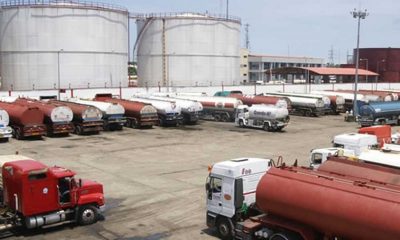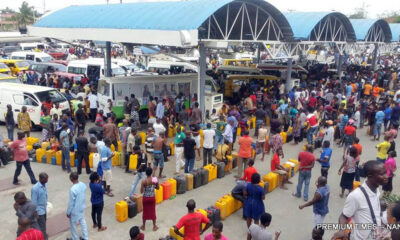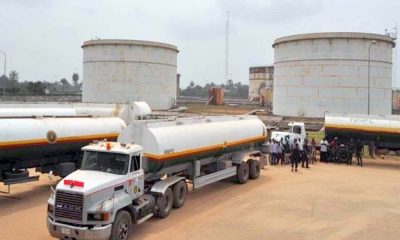News
Petrol scarcity looms as transporters threaten to stop product lifting
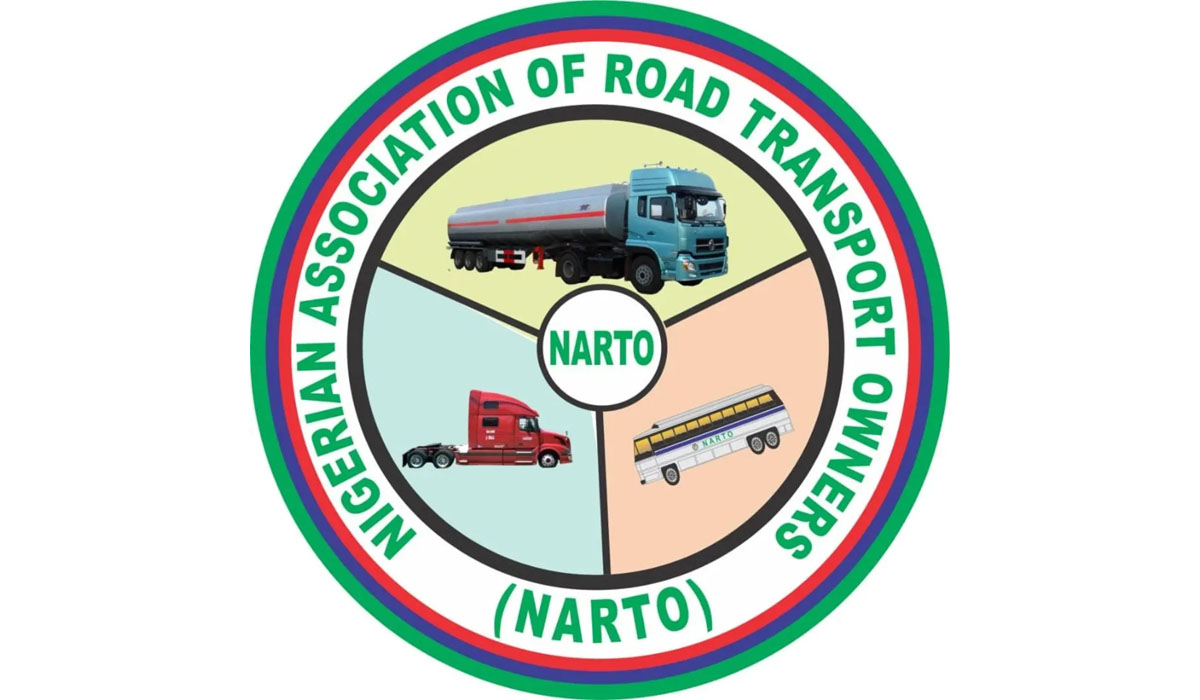
Petrol scarcity looms as transporters threaten to stop product lifting
The Nigerian Association of Road Transport Owners (NARTO) vowed on Thursday to stop lifting petroleum products beginning next Monday due to the high cost of operations.
Chronicle NG reports that Nigeria may witness another round of petrol scarcity when NARTO ceases operations on Monday.
NARTO members have repeatedly raised concern over the high cost of diesel required to power their trucks for the transportation of petroleum products across the country.
Oil marketers told reporters on Thursday that the price of diesel is between N1,250 and N1,400 per litre, depending on the area of purchase.
NARTO’s President, Yusuf Othman, said in a statement he issued in Abuja on Thursday that the statement was an official announcement from the association’s headquarters that members of the group would park their trucks on Monday.
“Why? It is because what we spend on operations is more than what we get in total, both in local and bridging,” he stated.
Othman said NARTO members were operating at a loss, and it was no longer sustainable for them to endure the losses.
“We will have to suspend operations from now until Monday. We cannot continue to operate at a loss. Most people have parked. A lot more are going to park. But from the point of view of the association itself, we are going to suspend operations on Monday,” he stated.
He said NARTO’s efforts to get the intervention of key stakeholders, the federal government, and industry operators had not yielded positive results.
READ ALSO:
- Jimi Solanke, Wasiu Ayinde and the cartoon called Nigeria
- Why we’ll continue to approve more universities – NUC
- Kano Censorship Board revokes licenses of Kannywood, Amart entertainment
The NARTO president said the association had written letters on the unbearable cost of operations to the Chief of Staff to President Bola Tinubu, the Minister of Petroleum Resources, the Department of State Services, the Nigerian Midstream and Downstream Regulatory Authority, the Nigerian National Petroleum Company Limited, and oil marketers.
“We have written letters up to the level of the Chief of Staff to the President. We have written to the Minister of Petroleum Resources (Oil). We have written to the Director-General of SSS. We have written to NNPC’s boss. We have written to the NMDPRA. We have written to the major marketers,” Othman stated.
He stressed that despite the letters, there has been “no response.”
Analysing the market situation, which the members have endured for several months, he stated that the same freight rate that applied when former President Muhammadu Buhari was in office was still subsisting.
“The Lagos to Abuja freight rate that was implemented when the dollar was N650 is still retained now that the dollar is N1,615. Everybody is aware that all our consumables, in terms of operation, are not produced in the country.
“So, by virtue of the rate of dollars, every consumable has increased. But the freight they are paying us has been the same since Buhari’s time. So how is that feasible? During Buhari’s time, one dollar was N650. Today, the dollar is N1,615. The average freight from Lagos to Abuja is N32,” he stated.
Othman further explained that “what I mean by local is that when you load in Lagos, you discharge in Lagos. And bridging means that when you load from Lagos, you come to Abuja. Lagos to Lagos, we are paid N120,000.
“AGO (diesel) alone to distribute fuel within Lagos is N140,000 because it is N1,400/litre. So, they give you N120,000, and you spend N140,000. So, how do you want to operate? You’ve not talked about the cost of vehicles, the cost of loading, or the driver’s allowance. That is for local.”
READ ALSO:
- I’ll leave in summer, Mbappe tells PSG directors
- Missing lady: Police arrest prophet, 6 other ritualists for killing lady to make N200m in 7 days
- Dollar hits N1,600 at parallel market
He stated that the cost of moving products out of Lagos or Warri to other states was far higher than what the government was paying to tanker drivers as bridging claims.
The government pays an agreed sum to transporters of petroleum products as bridging claims in order to ensure equality in the pump prices of these products across states, though this has not been the case.
NARTO is the umbrella organisation for commercial vehicle owners in Nigeria. The association represents the interests of those involved in the haulage of petroleum products, general cargoes, and passenger movement within the country and the West African sub-region.
NARTO has expressed several concerns regarding transporting petroleum products in Nigeria, impacting both their members and the overall efficiency of the process.
It has complained of poor road conditions, as frequent potholes, dilapidated bridges, and lack of proper maintenance lead to increased wear and tear on vehicles, higher running costs, and longer journey times.
The association has also raised concern about traffic congestion, particularly around ports and depots, as this adds significantly to delivery delays and further increases operational costs.
On inadequate parking facilities, NARTO stated that the lack of safe and designated parking areas often forced drivers to park in unsafe locations, leading to security risks and fatigue.
It had also raised concerns about the multiple checkpoints in Nigeria, as numerous security checkpoints could cause unnecessary delays and harassment for drivers.
Another issue is delayed payments, as late payments from oil marketers create cash flow problems for transporters.
Also, the association has called for safety because the theft of petroleum products, pipeline vandalism, and other security threats create risks for drivers and equipment.
On policy and regulatory concerns, NARTO had observed that some depots limit access to specific transporters, impacting competition and efficiency.
It had stated that inconsistent or ambiguous regulations could lead to confusion and enforcement challenges, adding that transporters often struggled to access affordable financing for vehicle maintenance and upgrades.
Petrol scarcity looms as transporters threaten to stop product lifting
chronicle
News
INEC Seeks N1.04 Trillion for 2027 Elections, Operational Needs – Amupitan
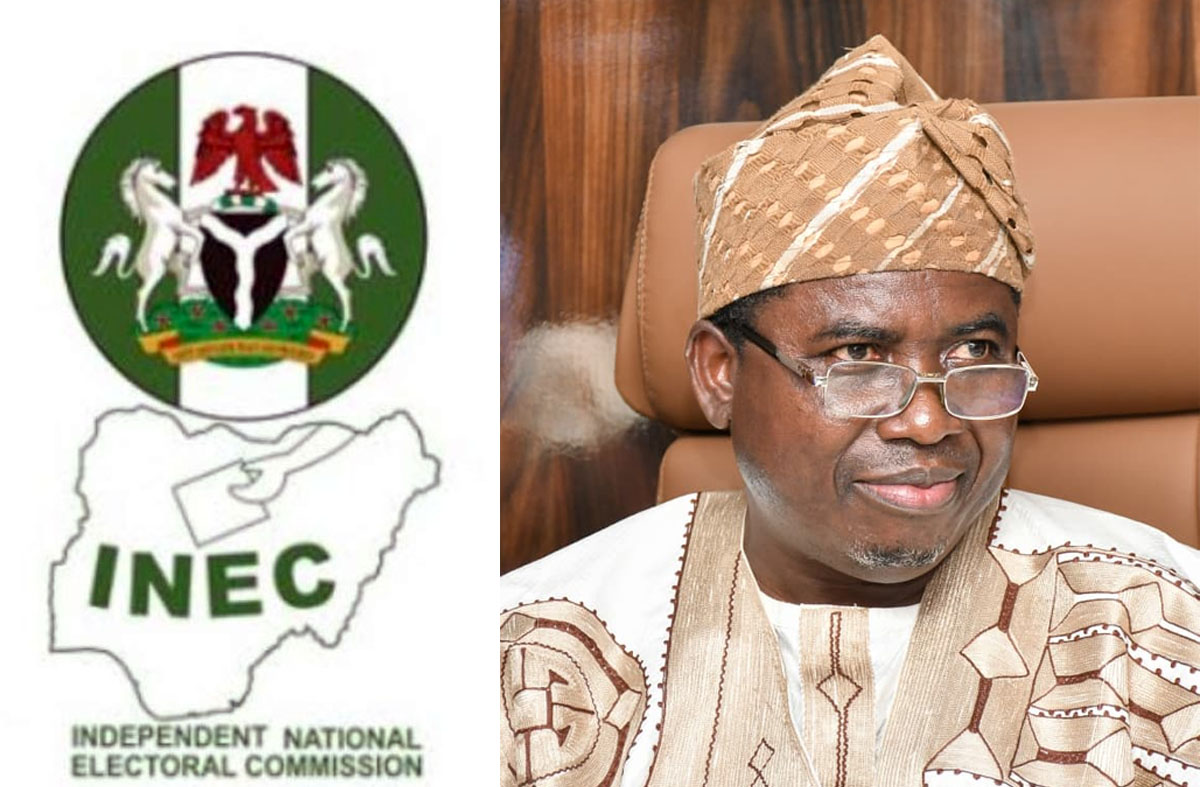
INEC Seeks N1.04 Trillion for 2027 Elections, Operational Needs – Amupitan
The Independent National Electoral Commission (INEC) has requested a total of ₦1.04 trillion from the Federal Government of Nigeria to fund off-cycle elections this year, the 2027 general election, and its operational activities in 2026, subject to approval by the National Assembly of Nigeria.
The request was made by INEC Chairman Prof. Joash Amupitan while defending the commission’s spending proposal before the Joint Committee on Electoral Matters of the National Assembly. Amupitan urged lawmakers to grant timely approval and release of funds, warning that delays could hamper preparations for upcoming elections.
According to the INEC chairman, the commission is seeking ₦873.778 billion for the 2027 general election and ₦171 billion for its 2026 operational activities. The 2026 allocation covers Federal Capital Territory (FCT) area council elections, by-elections scheduled for next week, and the Ekiti and Osun governorship elections slated for June and September.
READ ALSO:
- Alake: Killers of Mining Marshal Will Face Full Wrath of the Law
- Lagos Police Launch Manhunt for Suspect in Brutal Ajah Murder
- Lookman Shines as Atlético Madrid Hammer Barcelona 4-0
Breakdown of the 2027 Election Budget
The N873.778 billion earmarked for the 2027 general election includes:
- ₦379.748 billion for operational costs
- ₦92.317 billion for administrative expenses
- ₦209.206 billion for technology
- ₦154.905 billion for election capital costs
- ₦42.608 billion for miscellaneous expenses
For the N171 billion proposed for 2026 operations, Amupitan said:
- ₦109 billion would cover personnel costs
- ₦18.7 billion for overheads
- ₦42.63 billion for election conduct
- ₦1.4 billion for capital expenditure
He noted that the budget was prepared in line with Section 3(3) of the Electoral Act 2022, which mandates submission of election budgets at least one year before a general election.
Calls for Timely Fund Release and Dedicated Network
Amupitan criticized the envelope system of budgeting, describing it as unsuitable for INEC’s operational needs that often require urgent interventions. He appealed for a bulk release of funds, highlighting the need for a dedicated communication network to enhance accountability and transparency during elections.
“If we have our own network, Nigerians can hold us responsible for any hitch,” he said.
Lawmakers Back INEC’s Proposal
Senator Adams Oshiomhole argued that no government agency should impose the envelope budgeting system on INEC, emphasizing that full release of funds is critical for smooth election preparations. Similarly, House member Billy Osawaru called for the budget to be placed on first-line charge, allowing the commission access to all funds immediately.
Following deliberations, the joint committee approved a one-time release of INEC’s annual budget and pledged to consider increasing allowances for National Youth Service Corps (NYSC) members deployed for election duties. The proposed increase would cost ₦32 billion, equating to ₦125,000 per corps member.
Senator Simon Lalong, chairman of the Senate Committee on Electoral Matters, assured INEC of lawmakers’ support, pledging close collaboration to ensure a successful 2027 election. House Committee chairman Bayo Balogun also promised legislative backing but cautioned INEC against overpromising, citing prior misrepresentations about real-time uploads to the INEC Result Viewing (IReV) portal, which was never provided for in the Electoral Act but only in INEC regulations.
The approval of the commission’s budget and operational requests is expected to enhance election preparedness, technological deployment, and transparency ahead of the 2027 general elections, while addressing logistical and operational challenges that have hampered past polls.
INEC Seeks N1.04 Trillion for 2027 Elections, Operational Needs – Amupitan
News
Aso Rock Goes Solar as Tinubu Orders National Grid Disconnection

Aso Rock Goes Solar as Tinubu Orders National Grid Disconnection
President Bola Tinubu will fully disconnect the Aso Rock Presidential Villa from the national grid by March 2026 following allegations of electricity overbilling for power not supplied, the State House has confirmed.
The State House Permanent Secretary, Temitope Fashedemi, made the disclosure while defending the 2026 State House budget before the Senate Committee on Special Duties. He revealed that the solar mini-grid project at the Presidential Villa was completed in December 2025 and is currently undergoing technical testing ahead of a full transition to solar power.
Fashedemi explained that during the testing phase of the new solar installation, officials discovered what he described as significant overbilling by the electricity distribution company. According to him, the State House observed instances where it was billed for electricity that was not supplied and has begun reconciliation discussions to address what he termed “legacy liability.”
READ ALSO:
- 2026 Electoral Bill: Senate Explains Limits of IReV in Real-Time Transmission
- El-Rufai to Appear Before EFCC After Alleged Airport Arrest Attempt
- Four Sentenced to Death for Murder of Ahoada DPO in Rivers
The Villa is serviced by the Abuja Electricity Distribution Company (AEDC), which in February 2024 publicly listed several government agencies as debtors. At the time, AEDC said the Presidential Villa owed N923.87 million in unpaid electricity bills. Other major debtors included the Federal Capital Territory Administration (FCTA) and some federal ministries.
The Tinubu administration had earlier allocated N10 billion in the 2025 budget for the solarisation of the Presidential Villa through a solar mini-grid system. An additional N7 billion has been earmarked for the same project in the 2026 Appropriation Bill, bringing total allocations to N17 billion over two years.
Fashedemi noted that a similar transition to solar power at the State House Medical Centre in May 2025 has already demonstrated cost savings and reliability. He said the facility has operated almost entirely on solar energy and battery storage since then, with minimal reliance on grid electricity and no generator use.
He expressed optimism that by March 2026, the Presidential Villa would complete its transition and fully exit the national grid, relying primarily on renewable energy for its electricity needs.
The development aligns with broader efforts to promote renewable energy adoption in Nigeria, reduce public sector energy costs, and address concerns over electricity billing transparency. If fully implemented, Aso Villa will operate largely on solar power supported by battery storage systems, significantly reducing dependence on grid supply and diesel generators.
Aso Rock Goes Solar as Tinubu Orders National Grid Disconnection
News
2026 Electoral Bill: Senate Explains Limits of IReV in Real-Time Transmission

2026 Electoral Bill: Senate Explains Limits of IReV in Real-Time Transmission
The Nigerian Senate has declared that genuine real-time transmission of election results can only be achieved if the Independent National Electoral Commission (INEC) adopts a full e-voting system, clarifying ongoing debates surrounding the review of the 2026 Electoral Bill.
Chairman of the Senate Ad-hoc Committee on the Review of the 2026 Electoral Bill, Adeniyi Adegbonmire, made the clarification during an interview on Arise News Channel on Thursday.
According to him, the INEC Result Viewing Portal (IReV) was never designed to function as an electronic voting platform and cannot deliver instant transmission of votes under Nigeria’s current manual voting structure.
IReV Is Not an E-Voting Platform
Adegbonmire explained that IReV is strictly a results publication portal. He stressed that ballot papers are thumb-printed and counted manually at polling units before results are entered into Form EC8A by the presiding officer.
“It is the Form EC8A that has been filled manually and will be transmitted to IReV,” he said, adding that changing the terminology in the Electoral Bill from “transmit” to “upload” would not alter the process.
READ ALSO:
- El-Rufai to Appear Before EFCC After Alleged Airport Arrest Attempt
- Four Sentenced to Death for Murder of Ahoada DPO in Rivers
- Nigerian Army Rescues Eight Kidnapped Wedding Guests in Kano
The senator dismissed claims that the Senate intends to stop INEC from using IReV in the 2027 general elections, describing such reports as misinformation.
“The Senate never said INEC should not use IReV for the 2027 elections. IReV is software developed by INEC to publicise results already declared at polling units. It is not an e-voting platform,” he stated.
Manual Voting Still Determines Results
Under Nigeria’s current electoral framework, voters cast ballots manually, and votes are counted by hand at polling units. The presiding officer then records the figures in Form EC8A, which must be signed and countersigned by party agents before being uploaded to IReV.
Adegbonmire emphasised that electronic transmission begins only after manual collation is completed.
“When you have not complied with the proper filling of Form EC8A, you cannot transfer, transmit or upload it,” he said.
He further clarified that electronic transmission does not affect the sanctity of voting, since vote casting and counting remain manual.
Why E-Voting Is Key to Real-Time Results
The senator argued that for true real-time election result transmission, Nigeria would need a system where votes are cast, counted, and automatically transmitted electronically from polling units to a central server — a process only achievable through a legally backed electronic voting system.
Although INEC introduced technology such as the Bimodal Voter Accreditation System (BVAS) and IReV during the 2023 general elections, vote counting is still conducted manually under the Electoral Act 2022.
The ongoing review of the 2026 Electoral Bill has therefore reignited national debate over broader electoral reforms, digital infrastructure upgrades, and the possibility of transitioning to e-voting in Nigeria ahead of future elections.
Lawmakers say adopting e-voting would require substantial legal amendments, investment in secure digital infrastructure, cybersecurity protections, and extensive voter education.
Until then, the Senate maintains that real-time transmission, in the strictest sense, remains unattainable under the present manual voting system.
2026 Electoral Bill: Senate Explains Limits of IReV in Real-Time Transmission
-

 News3 days ago
News3 days agoOyo Muslims Reaffirm Loyalty to Sultan on Islamic Matters — Grand Chief Imam
-

 Education16 hours ago
Education16 hours agoSupreme Court Affirms Muslim Students’ Right to Worship at Rivers State University
-

 metro15 hours ago
metro15 hours agoIKEDC Sets Feb 20 Deadline for Customers to Submit Valid IDs or Face Disconnection
-

 metro3 days ago
metro3 days agoFormer NAHCON Chief Explains Why He Stepped Down, Denies Conflicts
-

 International3 days ago
International3 days agoUS to Deport 18 More Nigerians on ‘Worst-of-the-Worst’ Criminal List (Full Names)
-

 Business2 days ago
Business2 days agoDangote Refinery Slashes Petrol Price to ₦774, Ends PMS Bonus Window
-
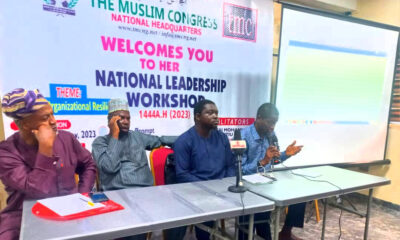
 metro2 days ago
metro2 days agoKwara, Katsina Bloodshed: TMC Condemns Attacks, Dismisses ‘Jihadist Preacher’ Claims
-

 Business18 hours ago
Business18 hours agoNaira Could Trade Below ₦1,000/$ With Dangote Refinery at Full Capacity — Otedola







